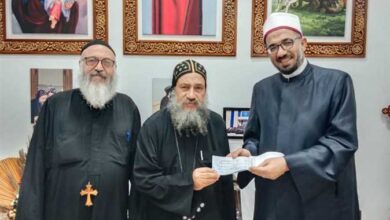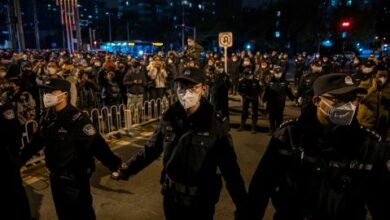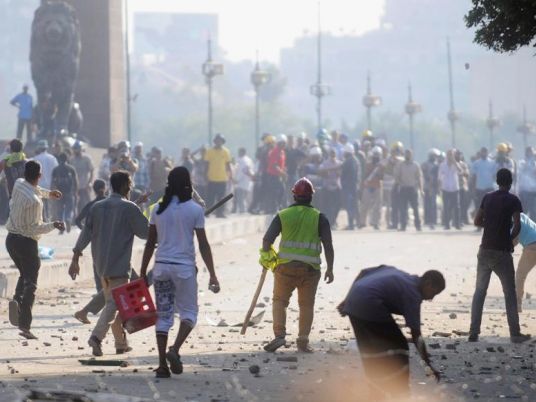Egyptian secular activists staged a sit-in Wednesday in downtown Cairo calling on the state to end discrimination against Egypt’s Christian minority and to bring security officials that have failed to address sectarian crimes to justice.
The protest was organized by the newly-established National Committee for Combating Sectarian Violence (NCCSV), a loose coalition of non-governmental organizations and secular political parties, formed last month to combat the threat of sectarian violence in Egypt.
“We want a secular state…not a sectarian one,” shouted the nearly 30 protesters that gathered in front of the Parliament building.
The activists, who were cordoned off by security forces, hoisted banners reading “Honesty, self-reflection and solidarity can overcome sectarian violence,” and “It’s not an individual crime or a criminal one–it’s a sectarian one.” The slogans referred to Egypt’s bloodiest sectarian incident in more than a decade, in which six Christians and one Muslim guard were killed in a 6 January drive-by shooting in the southern city of Naga Hammadi.
A delegation of prominent NCCSV members, along with independent and opposition MPs, subsequently met with Deputy Speaker of Parliament Abdel Aziz Moustafa. They presented Moustafa with a list of demands, including the passage of a unified law regulating construction of places of worship, which was first proposed five years ago.
“The People’s assembly must convene a special session to discuss and approve the law, which has been endorsed by both the Islamic and Christian religious establishments,” said Naguib Gobrail, president of the Egyptian Alliance of Human Rights Organizations.
The unified places-of-worship draft law was first proposed by the ruling National Democratic Party in 2005 in an effort to regulate the construction of mosques and churches in Egypt–but was never officially endorsed.
Christians have long complained of constraints imposed by the current law–dating back to 1856–which conditions the building of churches on presidential approval. Although President Hosni Mubarak issued a presidential decree authorizing governors to provide permits for building churches in 2005, many Copts claim the decree has failed to change the status quo in light of widespread fears that building new churches could provoke Muslim residents, especially in Upper Egypt.
Along with land disputes and personal quarrels, the construction and renovation of churches has remained a flash-point issue between Egypt’s Muslim and Christian communities. According to the Ministry of Religious Endowments, there are over 93,000 mosques in Egypt, while the number of churches is around 2,000–not enough, apparently, to serve Egypt’s Copts, who constitute roughly seven percent of the national population.
Protesters also called for drafting an "anti-hate" law that would outlaw perceived "discriminatory" practices. Activists further demanded that state officials who fail to legally address sectarian problems be held “politically accountable.”
“Most sectarian crimes are characterized by insufficient police protection,” said Khaled Ali, a leftist activist and NCCSV member. Following the Naga Hammadi episode, Christians claimed that security forces around their churches had been in short supply on the night of the incident.
Judicial authorities, according to Ali, must also be held responsible for failing to reduce sectarian tension by neglecting to refer perpetrators of sectarian crimes to court.
Last month, Egypt’s prosecutor-general took the unprecedented step of referring three men suspected of carrying out the Naga Hammadi slayings to an emergency state security court. Although the state’s quick reaction was welcomed by many in Egypt, human rights groups have raised concerns that holding a trial before an emergency court could eventually undermine the need for blind justice in such cases.
Lawyer Ahmed Fawzy also fears that the referral of those suspected of committing sectarian-related crimes to state security courts could provide an additional pretext for the government to extend the 29-year-old Emergency Law. "Expanding the notion of terrorism to sectarian offenses by certain state officials could also be used to justify the longstanding state of emergency," said Fawzy.
Activists also complain that extrajudicial “reconciliation sessions”–usually brokered by the ruling National Democratic Party and municipal authorities to resolve sectarian clashes–remain “ unjust practices.”
In these sessions, said Ali, security officers tend to force all parties involved in sectarian disputes to reconcile, threatening both sides with punishment–such as arrest and deportation–if they fail to comply. He added that such mechanisms served to erode the notion of equality and fair trial established by the formal legal system.




